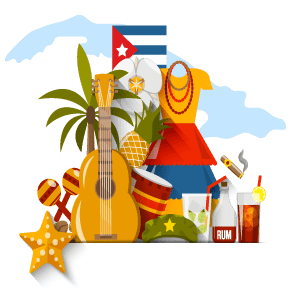
Cuban Translations
Cuban Languages
Cuba is a country in the Caribbean with a population of eleven million. It has the second-highest population in the Caribbean after Haiti. Aboriginal Taino People inhabited Cuba from the 4th millennium BC until the Spanish colonizers arrived in the region in the 15th century. The language and culture of the Spaniards affected the customs and traditions of the Aboriginal Taino People. Communism was established in Cuba by Fidel Castro. Since 1965, the Cuban Communist Party has been ruling the state. Journalism in Cuba is very dangerous under the rule of the Cuban Communist Party. Many journalists get imprisoned every year. Cuba had strong ties with the Soviet Union. The aid from the Soviet Union before its collapse supported the Cuban economy.
Today, Spanish is the most spoken language in Cuba. It is the official language of the country and is known as Cuban Spanish. It is a variety of Caribbean Spanish and has been influenced by other languages of the region. The Spanish of the Canary Islands has also influenced the language of Cuba. Spanish has taken many loan words from the English language.
The second most spoken language in Cuba is Haitian Creole. It is spoken by Haitian immigrants and their descendants all over the country. Lucumi, a dialect of Yoruba is also spoken in Cuba. Galician and Corsican are also spoken in the country by immigrants.
Cuban Language Evolution
The evolution of the Spanish language in Cuba is deeply rooted in its history, from the era of Spanish colonization to the present day. The language, brought by Spanish settlers, mixed with the indigenous tongues of the island’s original inhabitants, evolving into what we now know as Cuban Spanish. Over time, the Spanish spoken in Cuba has incorporated elements of African languages, European Portuguese, and other dialects from North America and Central America. This unique blend has given rise to Cuban slang, which differs significantly from the Spanish slang used in other parts of the world.
Cuban Spanish is not just a linguistic variant but a reflection of the country’s complex history and cultural diversity. The island’s political landscape, particularly under leaders like Fidel and Raúl Castro, has also influenced the language. Today, the Cuban president and other organs of power continue to shape the use of language in official contexts, ensuring that the entire island maintains a distinct linguistic identity. The impact of these developments is evident in the way Cuban Spanish is taught at institutions like the University of Miami, where the focus is on understanding the nuances that differentiate it from other Spanish dialects.
Cuban Translations
Language services have always been very important to the world. They keep us connected. Without them, individuals and companies will not be able to make much progress. When people apply for immigration to the United States but their documents are not in English, they have to hire language experts.
Spanish translators are in demand everywhere in the world. There are multiple reasons behind that. Spanish is one of the most languages in the world. Every year thousands of Spanish speakers arrive in the United States. But they won’t be able to send in their immigration or visa application without language services. Cuban people who want to study at a university in New York City will also require language services.
People also require English to Cuban Spanish translations from time to time. If an American wants to get married in Cuba to a native citizen, they will have to go through multiple steps. One of the steps will be to get notarized translations of your identity documents in Cuban Spanish. After obtaining Cuban translations, a person will also have to visit the Cuban Embassy in Washington DC to get their documents legalized. If both the home country of the applicant and the country they want to visit/marry in are a part of the Apostille Convention, then there will be no need to get documents legalized.

Trends Regarding English to Cuban Spanish Translations
Cuba has a planned economy where the majority of the means of production are run by the government. The Cuban economy is slowly beginning to change. The private sector is growing bigger. The country has opened its borders to more tourists and businesses. This has increased the need for Cuban translations.
Here are some common trends regarding English to Cuban Spanish translations:

1. Choosing the First Option
A lot of companies that are entering the Cuban market are not familiar with the Cuban language. They think Spanish in Cuba is the same as Spanish in Mexico. But the Cuban variety of Spanish is known as Caribbean Spanish. The culture of the region has influenced the Cuban culture and language. But since foreigners don’t know this, they often choose the first option they come across for translations. Many companies end up hiring inexperienced Spanish translators. Incorrect translations keep them from connecting with their target audience.
2. Literature:
Businesses are not the only ones who require Cuban translations. Cuban people want access to the world’s literature. They want to enjoy American literature in their own language. But it is only possible when qualified literary translators are hired to translate American literature. Reading both the English version and the translated version of a book can also help Cuban people learn the English language. It was Laura Mestre Hevia who made literary translations popular in Cuba.
The importance of literary translation was recognized when a poetry translation won the PEN America award. Many people believe that poetry in translation losses its meaning but the works of various famous translators have proved them wrong. Cuban poetry is also becoming famous around the world because of its translations in multiple foreign languages.


3. Marrying A Cuban Citizen:
The Cuban government has set up rules for foreigners who want to marry a citizen of Cuba. A person will have to obtain certified true copies of their personal documents. The true copies will have to get authenticated by the U.S. State Department in Washington DC. The documents must then be translated into Cuban Spanish. The final step of this process is to get your personal documents legalized by the Cuban Embassy in Washington DC. If you don’t get your documents legalized by the Cuban Embassy, you won’t be able to use them in Cuba. If you don’t get your documents translated before visiting the Cuban embassy, you will not be able to get them legalized.
Cuban Literature and Translation
Cuban literature has flourished over the centuries, with writers from the island gaining recognition across the globe. Works by Cuban authors are often translated into multiple languages, allowing a broader target audience to appreciate the rich cultural tapestry of the República de Cuba. The challenge of translating Cuban literature lies in capturing the essence of the original text while making it accessible to readers who may not be familiar with Cuban slang or the cultural references embedded in the narrative. For instance, the literal translation of certain terms might fail to convey the intended meaning, necessitating a more nuanced approach.
Translators working on Cuban literature often require experience in dealing with similar projects, and many possess academic backgrounds from institutions like Cambridge University Press or the University Press of the Dominican Republic. These translators understand the importance of preserving the unique voice of Cuban authors while making their works comprehensible to an international audience. Agencies like Absolute Translations are well-known for their expertise in this area, providing services that ensure the literary treasures of Cuba reach readers from Hong Kong to Central America.
Cultural Influence on Cuban Cuisine
Cuban cuisine is as diverse as its language, with dishes like black beans and rice serving as staples across the entire island. The influence of Spanish colonization is evident in many traditional recipes, which blend flavors from Spain with those of Africa and the Caribbean. The cuisine also reflects the island’s agricultural bounty, with ingredients like tropical fruits and root vegetables playing a central role. Over time, the dishes have evolved, incorporating elements from other parts of North America and Central America, making Cuban food a unique culinary experience.
Cuban Americans have played a significant role in bringing these flavors to the global stage, particularly in cities like Miami, where Cuban cuisine is celebrated for its bold and vibrant tastes. The University of Miami has even conducted studies on the cultural significance of food in Cuban society, highlighting how dishes like black beans are more than just meals—they are symbols of the island’s rich history and resilience. These culinary traditions continue to thrive both on the island and in Cuban communities abroad, maintaining a strong connection to the country’s past while adapting to modern tastes.
Cuban Diplomacy and International Relations
Cuba’s role on the international stage has been shaped by its history and political ideology. Despite being a country prone to political isolation, Cuba has maintained diplomatic relations with several nations, including those in North America and Central America. The island has a strong presence in the United Nations, where it often advocates for issues affecting the developing world. Cuba’s foreign policy has been influenced by its revolutionary history, particularly the Cuban president’s commitment to maintaining the country’s sovereignty and independence.
The legacy of the American War and the subsequent rise of communism under leaders like Raúl Castro have also played a significant role in shaping Cuba’s international relations. Today, the island continues to navigate complex diplomatic waters, balancing relationships with countries like the Dominican Republic while maintaining its unique political stance. The University of Miami and other academic institutions regularly study Cuban diplomacy, examining how the country’s leaders utilize legislative power and other organs of power to influence global policy. These studies are often published by respected academic presses, such as Cambridge University Press, providing valuable insights into Cuba’s strategic interactions on the world stage.
Common Cuban Spanish Translation Questions:
The first thing people need to understand about Cuban translations is that the Spanish spoken in Cuba is not the same as the language used in other Latin American countries. Only a native linguistic expert from Cuba can provide you with accurate language solutions. Choosing the right service provider is the best way to get accurate translations into Spanish.
Another question people ask is about certified translations in Spanish in Cuba. If a Cuban citizen wants to immigrate to New York City, they will need to get certified translations of all of their documents in English. Without official Cuban translations, immigrating to New York will not be possible.
If you are getting Cuban translations in New York City or any other part of the US, you will have to get them legalized from the Cuban Embassy in Washington, DC. It is also important to find the right Cuban Spanish translation services because if you show up at the Cuban Embassy with incorrect translations, they will not be legalized.
Expert Language Services
Finding a professional translator who can deliver a high-quality translation in your target language is crucial, especially when dealing with specialized documents or languages like African languages. Whether you’re based on a Caribbean island or operating globally, the perfect tone of voice in your marketing materials can make all the difference in reaching your audience effectively. A skilled document translator not only ensures accuracy but also captures the nuances and cultural context of the target language. From avoiding punctuation mistakes to maintaining common courtesies, a reliable translator team understands the importance of attention to detail and linguistic finesse. Despite offering competitive rates, they prioritize delivering a high-quality translation that reflects the integrity of your message while resonating with readers in their mother tongue. With expertise in African languages and other dialects, they guarantee a flawless translation that meets your communication needs with precision and professionalism.
There are many Cuban Spanish translation service providers these days. As the Cuban market is growing, the foreign companies’ need for language services has also increased. However, it is important to hire qualified professionals if you want to get accurate solutions. There are a lot of aspects of marketing translation that can only be handled by professionals. So, if you are wondering if different translators handle different tasks then the answer is yes. You will have to find the right specialist for every translation.
Frequently Asked Questions
What languages do Cuban translation services cover?
Cuban translation services cover a wide range of languages, including English, Spanish, French, and many others, to facilitate communication across diverse linguistic needs.
Are Cuban translators certified or accredited?
Yes, Cuban translators are typically certified or accredited professionals with expertise in various fields, ensuring accurate and reliable translations.
How long does it take to receive translations from Cuban services?
The turnaround time for Cuban translation services can vary depending on factors such as the length and complexity of the document. However, many services offer prompt delivery to meet urgent needs.
Can Cuban translators handle technical or specialized documents?
Yes, Cuban translators are adept at handling technical or specialized documents across different industries, ensuring precise and comprehensive translations tailored to the client’s requirements.
What are the rates for Cuban translation services?
Rates for Cuban translation services may vary based on factors such as the language pair, document complexity, and turnaround time. However, Cuban services often offer competitive rates while maintaining high standards of quality and accuracy.
